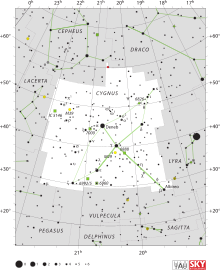Northern Cross (asterism)

The Northern Cross is an astronomical asterism in the northern hemisphere of the celestial sphere, corresponding closely with the constellation Cygnus the swan. It is much larger than the Southern Cross and consists of the brightest stars in Cygnus: Deneb, Sadr, Gienah, Delta Cygni and Albireo. The 'head' of the cross, Deneb, is also part of the Summer Triangle asterism.
Like the Summer Triangle, the Northern Cross is an indicator of the seasons. Near midnight, the Cross lies virtually overhead at mid-northern latitudes during the summer months; it can also be seen during spring in the early morning to the East. In the autumn the cross is visible in the evening to the West until November. It never dips below the horizon at or above 45° north latitude, just grazing the northern horizon at its lowest point at such locations as Minneapolis, Montréal and Turin. From the southern hemisphere it appears upside down and low in the sky during the winter months.
In Johann Bayer's 17th-century star atlas, the Uranometria, it was suggested that Alpha, Beta and Gamma Cygni formed the pole of the Christian Cross, while Delta and Epsilon formed the cross beam. The variable star P Cygni was then considered to be the body of Christ.[1]
Member stars[]
| Name | Bayer designation | Apparent magnitude | Luminosity (× solar) |
Spectral type | Distance (light years) |
|---|---|---|---|---|---|
| Deneb | α Cygni | 1.25 | 200,000 | A2 | 2615 ± 215 |
| Gienah | ε Cygni | 2.48 | 52 | K0III-IV | 72 |
| Delta Cygni | δ Cygni | 2.87 | 76 | B9 III + F1 V | 170 |
| Sadr | γ Cygni | 2.23 | 33,000 | F8 Iab | 1600 |
| Albireo | β Cygni | 3 | 1,200 | K2II | 430 |
See also[]
References[]
- ^ Wagman, Morton (2003). Lost Stars: Lost, Missing and Troublesome Stars from the Catalogues of Johannes Bayer, Nicholas Louis de Lacaille, John Flamsteed, and Sundry Others. Blacksburg, Virginia: The McDonald & Woodward Publishing Company. p. 131. ISBN 978-0-939923-78-6.
External links[]
- Asterisms (astronomy)
- Cygnus (constellation)